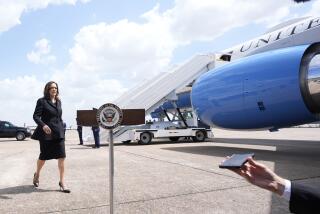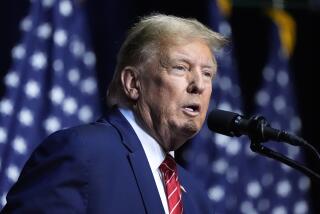NEWS ANALYSIS : Wilson Camp Sees Its Best Odds in 3 Northeast Primaries : Politics: Strategists say New Hampshire, New England and New York balloting are the best opportunities for gains by the governor.
- Share via
SACRAMENTO — More than a dozen top strategists in Gov. Pete Wilson’s presidential campaign gathered here this week for a two-day meeting that settled on a strategy they dubbed “The Three News”--New Hampshire, New England and New York.
The “Three News” are important to Wilson for two reasons, aides said. First, primary successes there could offer a candidate an early boost, since the contests come during a 16-day period beginning with the nation’s first primary in New Hampshire on Feb. 20. The five other New England states--Massachusetts, Maine, Connecticut, Rhode Island and Vermont--have combined to create a “Yankee primary” on March 5, two weeks after New Hampshire’s vote and two days before the New York contest.
Second, Wilson strategists believe that the governor’s support for abortion rights--in contrast to the other leading Republican candidates--could help in the Northeast, where GOP voters traditionally have taken a more libertarian approach to the issue.
“His position of pro-choice . . . is probably more favorable in the Northeast--where these early primaries are--than anywhere else in the country,” campaign Chairman Craig Fuller told The Times in his first extensive interview about Wilson’s presidential strategy.
Since launching his presidential bid earlier this year, Wilson has been running toward the political right, emphasizing conservative positions on affirmative action, immigration, welfare, taxes and the environment. It has not been an unusual position for him--although Wilson has never been a hero to conservative Republicans, that has not stopped him from campaigning as if he were.
But the political paradox for Wilson is that his advisers have come to believe his success in the presidential race will depend largely on GOP moderates.
Fuller said the campaign’s polling indicates Wilson has a popular profile as a fiscal conservative who supports abortion rights and has executive experience as governor of the nation’s largest state.
The campaign, despite the “Three News” strategy, will continue to stress its conservative themes. Next week, for example, Wilson expects the most national attention he has received this year when he squares off against the Rev. Jesse Jackson in San Francisco for a highly charged debate about affirmative action at a meeting of the University of California Board of Regents.
Abortion, on the other hand, will remain out of the campaign’s spotlight. In the arithmetic of the GOP contest, it is likely that the winner will need votes from some foes of abortion rights. Also, as Wilson has said repeatedly, he believes most voters are more interested in other issues and thus are turned off by candidates who tie their campaigns to abortion.
“The vast majority say this is not an issue they think . . . should be the driving issue in the campaign,” Fuller said.
*
At the same time, however, Wilson will look for the right opportunities to let voters know that he supports abortion rights. One such instance occurred earlier this month, when he was asked at a New Hampshire gathering how he differed from GOP front-runner Bob Dole, the Senate majority leader from Kansas.
“One of the critical differences, and we can go down a number of issues--he is pro-life, I am pro-choice,” Wilson said.
His strategy illustrates the political tightrope Wilson must walk in order to win the Republican nomination. Unlike candidates firmly tied to the conservative or moderate wings of the party, Wilson attempts to trod between them without causing too much disturbance in either.
“Wilson is in a little bit of a bind because he wants to get those pro-choice voters . . . but he doesn’t want to make himself unacceptable to the party,” said William Schneider, an independent political analyst in Washington. “So he could be left with neither.”
If he wins the nomination, Wilson supporters believe his strategy will leave him in a better position to challenge President Clinton in the general election. But as the governor has already seen, there are influential forces in the GOP that are not tolerant of a candidate who declines to choose sides.
*
Earlier this year, he angered moderate supporters when Fuller indicated that the governor would back away from a vow to fight to change the national Republican platform’s opposition to abortion rights. Wilson aides said the governor will protest the plank at the party’s convention next summer, but he would rather live with it than engage in a divisive fight.
A factor that helped Wilson officials settle on the “Three News” strategy is the support and hard work promised by Massachusetts Gov. William F. Weld, who already has proved one of the campaign’s best fund-raisers, surrogate speakers and back-room recruiters.
Weld aides said Wilson’s image as a fiscally conservative governor who supports abortion rights is a good match for the region. Ray Howell, Weld’s political director, said it is the same profile as not only his boss, but Republican governors in Connecticut, Rhode Island and New York.
“Their popularity suggests that Pete Wilson would do well,” Howell said.
Schneider said Wilson’s Northeast strategy could also prove effective because several of the states allow independent voters to participate in GOP primaries, providing another pool of possible supporters for candidates attractive to the political center.
“It could work,” Schneider said.
But Wilson’s strategy also faces daunting challenges.
The governor got a late start in the race and he has a major task in reaching voters in key states. His fund-raising is behind schedule. He faces a major distraction from the campaign to maintain his duties as governor, particularly these days, when the California Legislature is debating a state budget that is already overdue.
Perhaps most of all, Dole’s campaign has a solid grip in many of the areas targeted by Wilson.
“As to ‘Three News,’ I’ve got some bad news for the Wilson campaign,” said Nelson Warfield, spokesman for the Dole campaign. “Bob Dole is strongly in the lead in each of those areas.”
New York poses a particularly difficult problem for Wilson. Even under the best of circumstances, the state’s complicated election laws make ballot access difficult in its primary. In this campaign, those problems have been intensified because Republican Sen. Alfonse M. D’Amato, a major Dole supporter, has been orchestrating an effort among state Republican officials to keep other GOP challengers, such as Wilson, off the ballot.
Frustrated Wilson officials say they still plan an expensive and exhausting effort to get on the New York ballot, a task that requires working one congressional district at a time. And they claim that there are key Republicans in the state who are silenced by the party machinery, but privately encouraging Wilson to compete.
*
“I actually think we can make a showing in New York, but it’s going to require New Yorkers to decide they don’t want a United States senator to dictate to them who their nominee should be,” Fuller said.
Should Wilson’s Northeast strategy work, his campaign is hoping the momentum of a strong showing there would carry into a number of following contests. But in the period between New York’s primary and California’s on March 26, there are several crucial primaries in which Wilson would have to overcome his lack of a natural base of support.
Most notably, five Southern states will cast ballots on March 12, Super Tuesday. A week later, five states from the Midwest combine for a major contest in the nation’s Rust Belt.
Even in California, Wilson is suffering in polls that show him trailing Dole among Republicans and President Clinton among the entire electorate. This could severely hinder Wilson’s effort, since his campaign’s cornerstone is the presumption that he could carry California.
As a result, Fuller said the governor will do some campaigning over the next few months in his home state. “It certainly has our attention and it certainly means that we will never take California for granted,” Fuller said.
More to Read
Get the L.A. Times Politics newsletter
Deeply reported insights into legislation, politics and policy from Sacramento, Washington and beyond. In your inbox twice per week.
You may occasionally receive promotional content from the Los Angeles Times.










